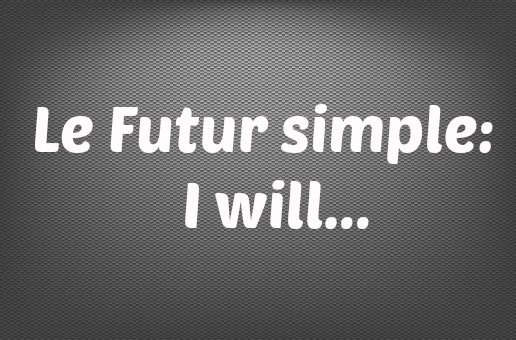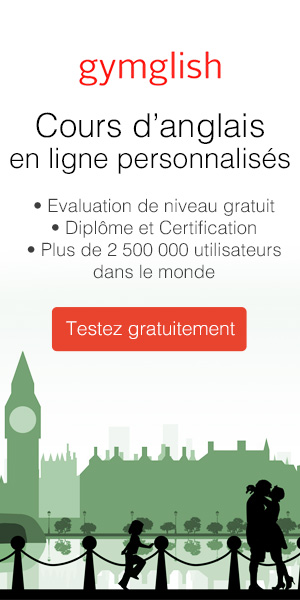Le futur simple (I will)
Le futur simple a deux formes différentes en anglais:
On peut utiliser ‘will‘ ou ‘be+going to‘.
Même si on peut les utiliser de la même manière, elles ont souvent une signification différente.
Avec un peu d’entraînement leur différence vous paraîtra plus claire. Dans les deux cas les deux formes réfèrent à un moment spécifique du futur.
Dans cette leçon on va voir le futur simple avec ‘Will‘. Cliquez-ici pour voir la deuxième partie avec ‘be+going to‘.
GAGNEZ DU TEMPS ! TÉLÉCHARGEZ EN UN CLIC LE PACK COMPLET: 70 FICHES DE GRAMMAIRE + LES TEMPS EN PDF
PLUS D'INFOS_
1/ Formation du futur simple avec Will
Sujet + Will + verbe à l’infinitif
| Affirmative_ | Négative | Question | |
|---|---|---|---|
| I / you / he / she / it / we / you / they_ | I will play | _I will not (= I won’t) play_ | _Will I play?_ |
_
- (+) I will take the bus.
- (?) Will I take the bus?
- (-) I will not take the bus (= I won’t take the bus).
2/ Utilisation
* Quand on décide de faire quelque chose, ou que l’on propose de faire quelque chose… ou pour refuser de le faire (on prend la décision au moment où on parle):
- What would you like to drink? => I’ll have a coffee please.
- I’ll send her an email this afternoon.
- I don’t think I’ll buy that house.
- I will help you to clean up the mess.
- I’ll open the door for you.
- Hold on. I’ll get a pen.
- I’ll pay by credit card.
- I won’t go there alone.
- I forgot to call Phil. I’ll call him now.
- I won’t leave until I’ve seen the manager.
- Are you hungry? I’ll prepare some sandwiches.
- You look tired. I’ll get you some coffee.
* Pour exprimer une prédiction ou une hypothèse future (on peut aussi utiliser be+going to):
- If you ask her, she will give you a lift.
- She will be surprised when she will see that.
- Who do you think will win the race?
- He won’t believe what happened.
- I don’t think Joey will come tonight.
- It will snow tomorrow.
* Pour demander à quelqu’un de faire quelque chose (avec ‘will you… ?):
- Will you please turn the light off? I’m going to bed.
- Will you come with me to the party?
- Will you please bring me my wallet?
- Will you please listen to me?
- Will you help me clean up the table?
- Will you marry me?
* Pour exprimer une promesse
- I will text you when I arrive.
- I will not go to the club tonight (= I won’t go to the club tonight).
- I’ll make sure the dog has enough food.
- I promise I won’t tell her about your secret.
- I’ll be careful, don’t worry.
* Pour exprimer un futur certain (avec be)
- The meeting will be at 10am.
- I will be in Melbourne next week.
- I’ll be at the bar after the meeting.
- There will be 40 people at the party.
* Pour exprimer le futur conditionnel
- If something happen, I will call you.
- If we can’t find your place, we will come back home.
3/ Notes
⚠️ On utilise souvent ‘I think I’ll…’ et ‘I don’t think I’ll…’
- I’m hungry. I think I’ll have something to eat.
- I don’t think I’ll go out tonight. I’m too tired.
⚠️ Shall et Will
Shall est parfois employé à la place de Will pour parler au futur, mais c’est très peu courant en anglais moderne et seulement en littérature, dans la poésie ou dans les textes de lois avec he, she, you, they:
- You shall not pass ! (= tu ne passeras pas !)
- You shall not kill (= tu ne tueras point)
Si vous entendez Shall dans une phrase, c’est qu’il est principalement utilisé pour faire une offre ou une suggestion, ou pour demander un conseil (avec I ou We) .
- Shall we go?
- Shall I open the window?
⚠️ On peut utiliser ‘won’t’ pour dire que quelqu’un ou quelque chose refuse de faire ce que l’on veut:
- The car won’t start.
- I’ve tried to talk to her but she won’t listen to me.
⚠️ Forme active / passive
- Active => Tim will finish the work this afternoon.
- Passive => The work will be finished this afternoon.
⚠️ Place des adverbes
Les adverbes tels que always, only, never, ever, still, just, etc. se placent après will:
- You will never be good at Street Fighter.
- Will you ever be good at Street Fighter?
©Anglais-rapide.fr – ne pas recopier ces leçons sur d’autres sites !


Just my first steps in English in order that to improve my level for communications in my travelling
in the world wide any countries to change the nature and ideas I like very well to progress
my way until the best I hope in my life and follow my age a little that I find the difficults
to learn alone by myself I search always to find a good way to continue
at see you soon.